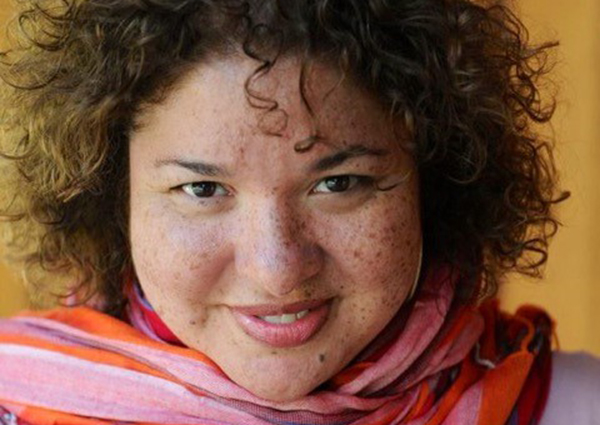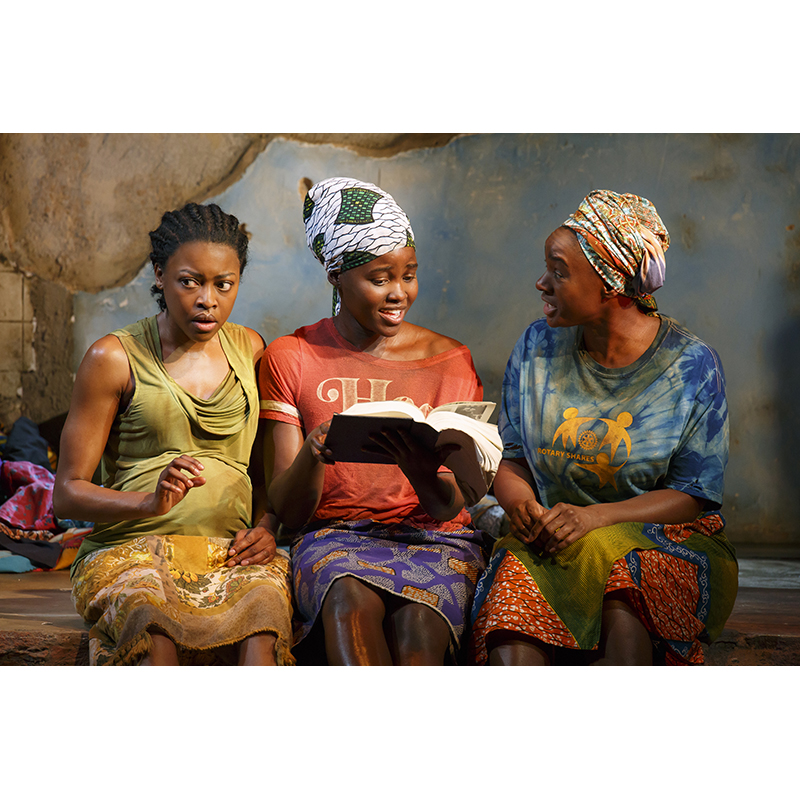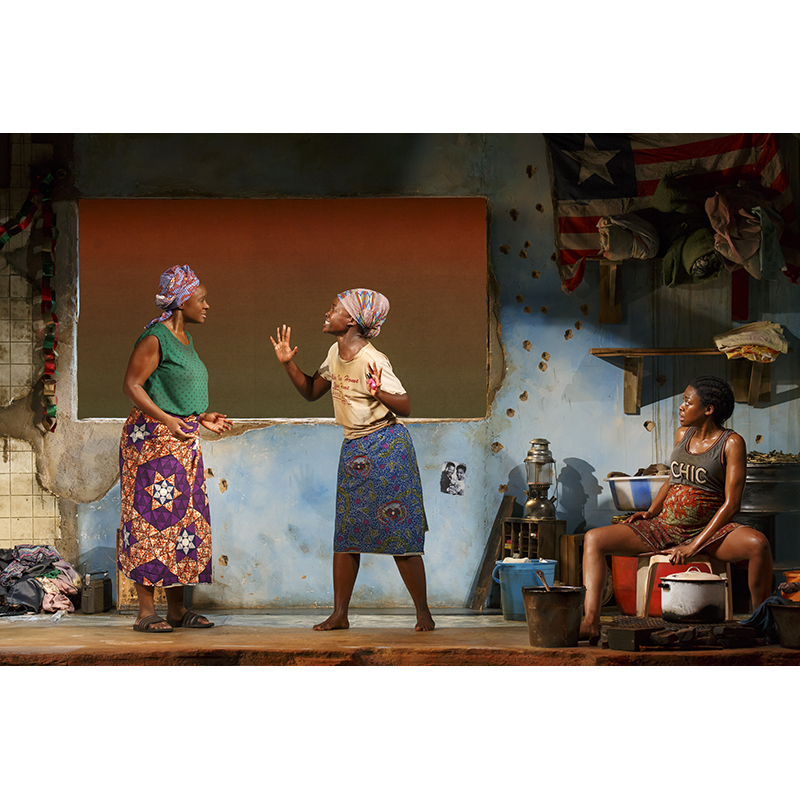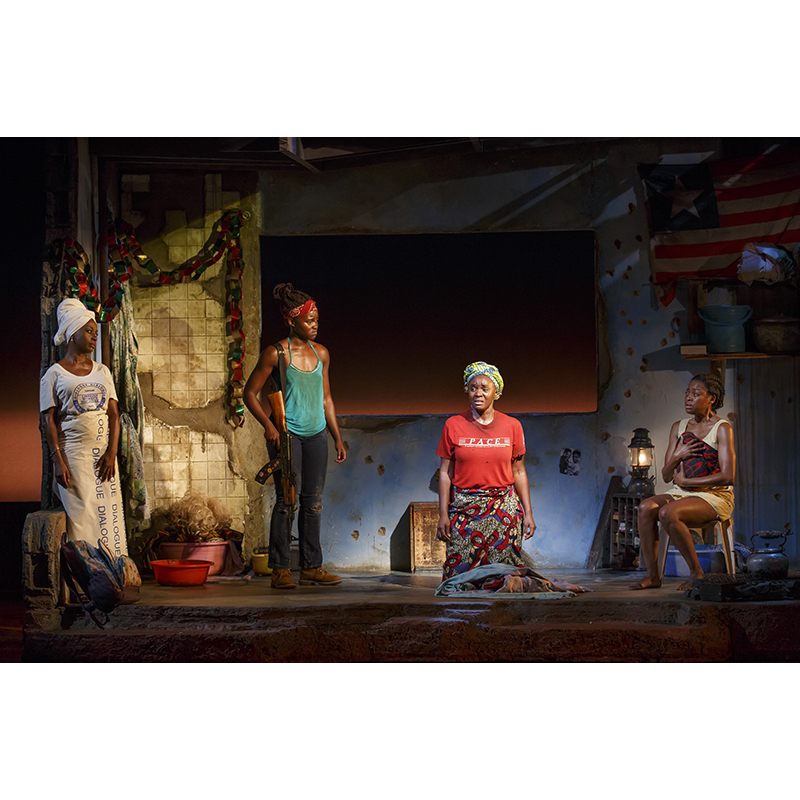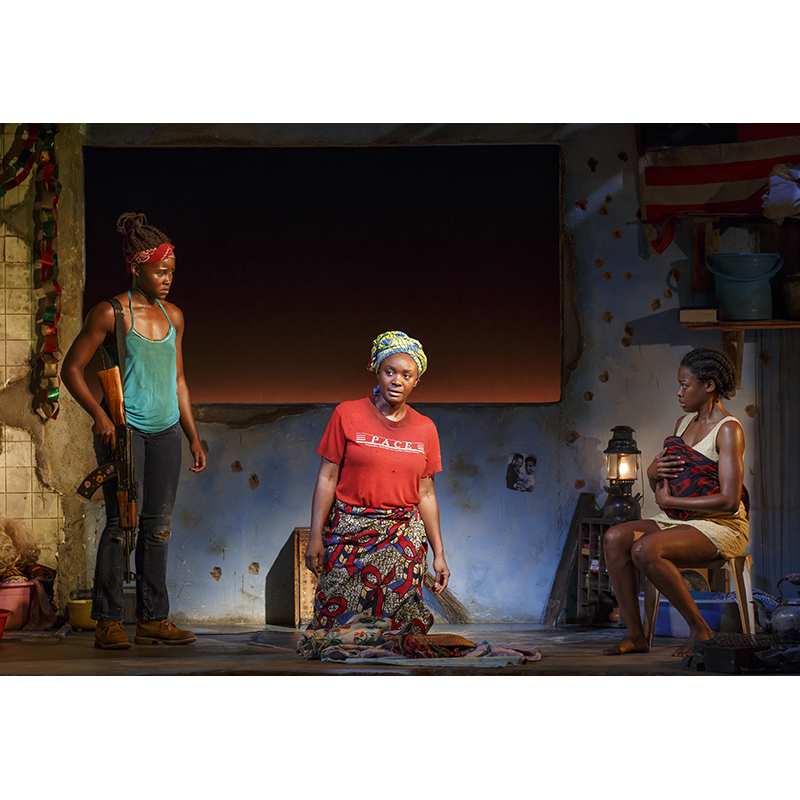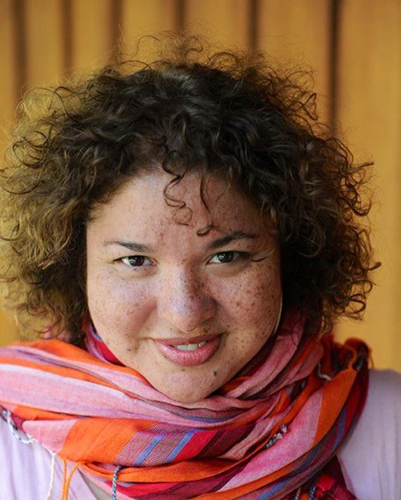
I first met Liesl Tommy about six years ago, at NYU, where she was directing a staged reading of a new play by the young playwright Danai Gurira. Set in rural Liberia during their second civil war, Eclipsed told the story of women brought to a bombed-out rebel army compound to serve as sex slaves. Among the cast were Pascale Armand as the irrepressible and conspicuously pregnant Bessie, Uzo Aduba (Orange is the New Black) as the maternal Helena, and Lupita Nyong’o (12 Years A Slave) as the newest arrival, “The Girl.” Few could have predicted that so many of the talented women on stage that night were headed for stardom. Even Gurira, who continues to write sought-after plays, would soon become a leading actress, as Michonne in AMC’s The Walking Dead.
Tommy’s rise to the top of her field, while certainly quieter, has been no less dramatic. Born in Cape Town, South Africa, during the apartheid, Liesl was raised in a colored township until her family moved to Newton, Massachusetts, when she was fifteen. She acted in many plays at Newton North High School, where she fell in love with theater, and went on to study acting at a conservatory in London before entering a joint MFA program at Brown University and Trinity Repertory Company. Early on, Tommy’s teachers saw her knack for directing—“for creating community,” as she describes it—and pushed her to helm a production each year. Before long, she had made the critical transition from acting to directing full-time.
I next spoke to Tommy several months after the reading, at a dinner party at the home of Eclipsed actress Zainab Jah, who plays the gun-toting Maima. Zainab cooked lamb, Adepero Oduye brought egusi soup, and we ate and talked until midnight, code-switching from pidgin to patois to industry jargon to the Queen’s English without skipping a beat. Hailing from Sierra Leone, South Africa, Zimbabwe, Kenya, Nigeria, and the Caribbean, we were black women artists working in New York City—we embodied multi-hyphenate identities, united by a shared creative struggle. Tommy has the drive, confidence, and enviable work ethic of a woman who knows that she will have to win recognition by force.
Now a world away from that black box at NYU, Eclipsed recently moved from a sold-out run at the Public Theater to the John Golden Theatre on West 45th, making history as the first all-female production on Broadway. For her part, Tommy now regularly flies around the world directing projects of her choosing. She has guest-directed at The Juilliard School, Trinity Rep/Brown University, The Strasberg Institute, and NYU/Tisch School of the Arts. She is also the program associate at the Sundance Institute Theatre Program.
I spoke to Tommy by phone shortly after the Broadway debut of Eclipsed.
—Iquo B. Essien for Guernica
(L-R). Akosua Busia, Lupita Nyong'o, Saycon Sengbloh, and Pascale Armand in a scene from Danai Gurira's "Eclipsed" directed by Liesl Tommy. (Photo by Joan Marcus).
Guernica: I saw a public reading of Eclipsed at the Hedgebrook Women Playwrights Festival back in 2010. Can you talk about how the project developed from that point until now? How did your partnership with writer Danai Gurira come about?
Liesl Tommy: Five or six years ago, Danai sent me a copy of the play. She was getting ready to do a staged workshop for it at the McCarter Theatre [in Princeton, NJ] and she wanted a director who she felt would understand the play without having to spend hours and hours contextualizing. Obviously, I’m from South Africa, and a lot of the work I do is political. I’ve also traveled widely on the continent of Africa, and my point of view is very international. So I read it and I knew within the first five pages that she was doing something very unique and special and theatrical, and that with this play she was pushing form in a way that was fresh. I had been yearning for something about Africa, about women, and I just thought, “Thank God this play exists!”
Guernica: Can you talk about your experience working with Danai?
Liesl Tommy: Once she and I began working together on Eclipsed, we never stopped. We did it [at the McCarter], and we did a full production at Woolly Mammoth [in Washington, DC]. But then we couldn’t get it to New York. You know, sometimes I think New York theater can be so insular. For some people something like this is still a hard sell. And when Fela! happened, they said, “We’ve got one African play; we don’t need another one.” So we just had to let it go and trust. Danai actually said to me, “I feel we are not done with this play, and we’ll have another chance for New York.” It just wasn’t the right time. But we never in our wildest dreams imagined it would be this.
Guernica: So how did your run at the the Public Theater in Manhattan come about?
Liesl Tommy: If it wasn’t for the interest of Lupita Nyong’o, we might still be sitting on the shelf. When she started feeling like she wanted to get back into theater, and everyone was asking what she was going to do next, Eclipsed was the only play she was interested in working on. She had been talking to Oskar Eustis at the Public, who was my teacher in grad school and who gave me my first professional job, directing The Good Negro. At the same time, we’d been talking to Stephen Byrd, the commercial producer who ended up providing the enhancement money. So all of the right energies came together to make it happen.
Guernica: And how did it get from there to Broadway? Was that always your intention?
Liesl Tommy: At first we weren’t sure how people were going to respond. Lupita has legions of fans, but we just didn’t know if people were going to come and see a play. But when the run at the Public sold out immediately, the producers started feeling that this actually could be viable. Stephen Byrd and Alia Jones-Harvey from Front Row Productions—who are the only African-American lead producers on Broadway right now—really believed in the play. They believed in my vision, they believed in what we were doing, and they made it happen.
Guernica: What have been the biggest surprises for you in opening on Broadway?
Liesl Tommy: Well, what has been an incredible joy is the diversity of the audience. It’s so incredibly meaningful to know that there are people in this audience who are saving their money to come and see this. It’s not just disposable income. I get letters and Facebook messages; people stop me and say the most beautiful things.
There was this one amazing story of these two older African-American women who traveled from Virginia, saw the play, and then went out and bought tickets again for the very next night because they loved it so much. They had never seen anything like this before. They hadn’t seen five black women just living and breathing and being alive and being different and being funny and being tragic and being angry. They hadn’t seen that on stage. And that’s happened a number of times. People have told me, “I’ve seen it two times, I’ve seen it three times, I’m bringing my sister, I’m bringing my aunt.” It’s a beautiful thing.
Guernica: Most of the cast I saw at the Playwrights Festival reading are still in the play. What has it been like to be able to work with an ensemble over time?
Liesl Tommy: I’m very loyal and I also think one of my strengths is casting, probably because I worked in casting for a while and was an actor before that. Pascale Armand did the very first workshop, and Zainab Jah did it at Yale. Lupita understudied it at Yale, and Lupita’s cover, Ayesha, did it at Wooly Mammoth. One of the great thrills of this project has been bringing these women who I have worked with for so very many projects—who may not have your commercial actor look, but who are gifted, gifted performers—with me to Broadway. And everybody can see how brilliant they are. The fact that the producers were absolutely happy to bring our people with us feels great.
Guernica: And it seems rare, is that right?
Liesl Tommy: Definitely! I’ve directed shows where they are like, “This could be commercial!” and then the first conversation is about recasting it. But you know, in this case, that was never even a question.
Guernica: Can you talk about casting veteran Ghanaian actor Akosua Busia—who none of us have seen for years—as Rita, the visiting peace activist? How were you able to get her involved?
Liesl Tommy: That was a stroke of genius that came from Jordan Thaler and Heidi Griffiths, the casting people at the Public. We were having a brainstorming session and Jordan suddenly turned to his computer and started googling a name. He showed me a picture of this beautiful woman and said, “She’s been out of the business for like 10 years raising her daughter in Ghana, but this is who we have to get.” And I thought “Wait, isn’t that Nettie from The Color Purple?”
We already had auditions scheduled and he called me and said, “You’ll never believe it but she happens to be in town visiting her sister and she’s going to audition.” She came in, and Danai and I were, to be honest, kind of starstruck. She did a really beautiful audition, really beautiful, and we felt so grateful because it’s a hard role to cast. This is an African female character from an upper class, and the class dynamic is very specific, so an actor needs to have an internal sense of what that is. She just got it and it was kind of amazing.
That was my point of entry into the play artistically—the idea that this male force wields so much control and power over these women yet is completely unseen.
Guernica: Eclipsed has an entirely female cast. Yet one of the most striking aspects of the play for me was the silent, invisible presence of the male CO who holds the women captive. Can you talk about this kind of absent male presence and how you worked with the actors to get us to feel him, even though we never see him?
Liesl Tommy: Remember when I said that after five pages I knew this play was amazing? When I read it the first time and I realized that Danai had not written the male character into the play, even though he was in the play, I knew that there was something brilliant going on. The imagination and the vision that it took for her to come up with that idea had me hooked immediately. So that was my point of entry into the play artistically—the idea that this male force wields so much control and power over these women yet is completely unseen. All that we can do is look upon the consequences for the women themselves.
We spent a lot of time working on movement and on creating an energetic shift when the man who is not there “appears” on stage. I also worked with the lighting and sound design to create a completely subliminal tension. We have a sound cue, a subtle drone almost, and the lights shift so that people can feel fear and anxiety. It’s actually a horror movie technique that we perfected over the weeks. As a director, I found this dread and this not-present-presence really exciting to play with and explore.
Guernica: In other interviews, you have mentioned being fascinated with humanity’s violence. Why are you drawn to violence, and what motivates you to portray gender-based violence on stage?
Liesl Tommy: I’m of the belief that as human beings, we are really just one extended blackout away from being cave dwellers again. And we see over and over again how unsafe women are when societies break down. So violence is something we really have to be vigilant about. As an artist working on stage, I like to explore how, when, and why we become violent, because it’s been so glorified and made to be so sexy that I always yearn for a more complex portrayal.
Now, because I’m quite a physical person—I was a very movement-driven actor when I was still performing—physical intensity is something that is part of my artistic vocabulary. So the fights between the girls on stage, for example, are quite brutal because that is interesting to me. It is interesting to me to take something that we usually see on film and make it live and see what that does to the audience and to the storytelling process. I’m always looking for the most visceral exploration of the human condition.
When we look at countries that have lost the democratic process and are living in poverty, the lives of women are so very unsafe. That’s something I think about all the time. When you are a woman in a society like that and then you achieve some power, do you respond as a woman, or do you respond as a woman who has watched how men in power behave? That’s what’s so interesting and great about Eclipsed: it shows you every kind of woman, every way of living as a woman, daughter, sister, wife. No matter who you are or where you come from—and I’ve seen this night after night in previews—you can relate to some aspect of some part of these women because there is such range on display.
From early childhood there is something deep down inside of you that never feels safe once you understand that you are a second-class citizen in your own country.
Guernica: How have your experiences growing up in South Africa informed the way you approach the subject of violent conflict as a director?
Liesl Tommy: This is a big, big question. Growing up in apartheid—I’m from a colored community, a mixed-race community—I lived in a colored township and went to colored schools. And when you’re living in such an incredibly oppressive political environment, violence and danger are all around you, and you know you cannot be safe. From early childhood there is something deep down inside of you that never feels safe once you understand that you are a second-class citizen in your own country.
One consequence of an institutionally racist political system is violence. That’s the way the government controls its people, so violence becomes a top-down mode of operation in the culture. Society is violent, and men of color in South Africa are completely emasculated—and we know what the consequence can be for wives and children and families of men who are being oppressed in the workplace. So there’s a lot of dysfunction in society and it’s something that I felt very deeply growing up.
At the same time, I come from a family of amazing, strong women—both of my grandmothers, my aunts—who have been absolutely incredible role models. Every time I have a chance to tell stories that are like theirs, there are just never enough ways for me to give voice to the experiences these women go through.
Guernica: Are there cities you prefer to work in or audiences you prefer to share stories with? How would you compare the theater culture in New York or LA with other cities you’ve worked in, either here or abroad?
Liesl Tommy: I feel so incredibly fortunate that I’ve been able to travel extensively in East Africa and all over this country, as well as in Canada and Denmark. I’ve been able to work with French writers and German writers, and I’ve been able to work on things that are both personal and political without ever having to compromise on content. That was the whole reason I became a director in the first place, because I felt, as an actor, that I didn’t have enough control to take on the more political stories that interested me. I am so very lucky that I’ve been able to do that while learning from each city and each community.
Because I love theater, I have to care about who the audience is, and the more I know about the audience the more I know how to challenge them. It’s not about handling them or making them like me, it’s about challenging them and getting that “I’ve never seen this before” effect. Take, for example, when I did Les Miserables in Dallas. I thought about that Dallas audience, and I went down to do a couple of site visits, and I wondered, “How am I going to get this primarily white, fairly affluent Dallas audience to care about Les Miserables in a way that doesn’t just replicate the love they felt for it twenty years ago?”
That musical is so amazing and classic, and the music is so incredibly beautiful, but I wanted more. Again, I wanted that “lean forward” effect. So I made it contemporary. I cast an Indian actor in the lead role of Jean Valjean, and I had people of color all throughout. One of the questions I asked myself was, “What would have to happen in America for the students to rise up en masse?” So I decided to make my students look like the actual students in Dallas today—all races and hyper-contemporary—to see if I could engage this fairly conservative Dallas audience in the story. There was a lot of resistance from all sides, particularly from musical theater purists, but the theater was really excited about the idea and supported me 100 percent.
In the end, it was one of the most successful shows they’ve ever had. I was told they made more money on that show than they did on the entire season. It took on a life of its own and it became this internet phenomenon because no one had ever done that to this musical. People were flying in from all over the world to see it. One of the great lessons I learned from the project was that identifying who is in a community, and trying to talk to that community really pays off. I make work, not just to make work, but to have a conversation with specific people about a specific thing.
Guernica: As a Nigerian filmmaker who has seen a lot of theater and film about Africans on the African continent, I actually felt a slight discomfort watching Eclipsed at the Public with a predominantly white audience. There is a lived experience of an African identity that you bring to your understanding of the play, and as I’m sitting with a predominantly white audience, I’m wondering what they are seeing or feeling or understanding or taking away. What does it mean to bring this play to a Broadway audience?
Liesl Tommy: It’s such an interesting question because there was a period when I did a four-city tour of Ruined, Lynn Nottage’s play about war in the Congo, and I did Eclipsed, and I also did a project in Canada called The African Trilogy. And while I was doing it, I was so happy that I was actually able to do work that focused on Africa. But there came a point afterward when I was on the verge of physical and emotional exhaustion from being in these incredibly intense rehearsal processes for a couple of years in a row. I had an existential crisis in which I thought, “Wait, am I a vessel for good and for change, or am I just perpetuating the incredibly general idea that all Africa is is chaos?” It was a very dark period because I lost my understanding of what I was doing. I still believed in the shows, I believed in the vision, I believed in the way that I directed them, but there was suddenly a point where I thought, “Am I doing the very thing that I indict the western media for doing, which is only showing one side?”
I don’t know that it suddenly clicked, like, “No! I’m doing amazing work! Keep it up!” I wish it was that simple. All I can say is that I went back and saw one of the shows months after it had opened, and there were some refugees from the Sudan in the audience. Watching their response made it all worth it. So I cannot concern myself too much with the dominant culture’s response to my work. If I’m working from a place of truth and rigor, then that is my guide. And I believe that these women’s voices matter.
Guernica: The Broadway production of Fela! was eventually able to tour Lagos, where it’s set. Have you ever considered performing Eclipsed in Liberia, particularly now that we are in this post-Ebola moment?
Liesl Tommy: Danai and I have thought about it. It’s had three or four productions in South Africa; it’s had productions in Zimbabwe. It’s really about infrastructure at this point, in terms of how to bring it over there. It’s something Danai and her foundation have been struggling with for a while. But we hope and believe that it will get there. I mean, if we can get to Broadway, we can get to Liberia!
Guernica: Exactly! What has it been like to create space for yourself in the theater world as a director in a black female body, and in an African body no less? What obstacles, if any, have you encountered?
Liesl Tommy: Listen, we all know what the challenge is: we live in a racist and sexist society, and our art form and our artistic environments are absolutely an extension of our larger society. So racism and sexism are something we have to contend with daily.
When I was very young and emigrated to the States, we were told all the time we had to be better than and work harder than everyone around us just to be seen as inferior—never mind equal, never mind better. Like most immigrant children, I absolutely took that to heart and set incredibly high, sometimes unachievable standards for myself. But it was necessary, because no one wants to make space for you. You have to fight for it; you have to claw your way in. And you do have to be better than everyone around you. You do have to be more rigorous, I believe. I’m sure my peers think that’s an incredibly arrogant thing to say because it means that I think I’m better than them, but that’s not what I mean.
Take Eclipsed, for example. I remember before we started rehearsal, after the announcement that we were going to move [to Broadway] came, I was at an event, and there were a lot of theater people there and a number of commercial producers were there and they said, “Oh my gosh, we loved it! But do you really think it should be moving to Broadway?”
It’s been interesting to see the different ways racism and sexism intersect, and to see the limits of solidarity in feminism.
Guernica: What kind of question is that?
Liesl Tommy: Exactly. What kind of question is that? And inside, you feel that burn, you feel like your whole face is turning red. And in a social setting I can’t do what I want to do, because I have to try to be civil, so I just say, “Absolutely I think Eclipsed belongs on Broadway! Why doesn’t it belong on Broadway?” The only thing to keep it from Broadway is if people don’t think it’s going to make money, because that is the criteria for commercial theater: profit. But there are clearly enough investors who believe in the show, so why not? Who says what should and shouldn’t be on Broadway?
And I’ll tell you something else that was really interesting to watch: When it came out that we were actually making history by being the first all-woman cast, with a female director and a female writer, there were a lot of people who loved that story, but there were also a number of people who seemed more annoyed than anything else that we were the ones making that history. It’s not just about being the first black women but the first women. There were, again, a number of encounters where I got the impression that people wished that the first all-female production on Broadway didn’t look like us. And we got the most traction, in terms of the press, when the narrative changed to being about the “first black women.” You know, during black history month was when the story really got picked up. So it’s been interesting to see the different ways racism and sexism intersect, and to see the limits of solidarity in feminism.
Guernica: What has it been like to build the play with and around a collection of specifically African women?
Liesl Tommy: Well, I’ve been doing that my whole career. There was a period when I was working at New York Theater Workshop as a casting associate before I was a director. I had a fellowship there, an artistic fellowship, and I had access to all of these files of actors. One day I decided to hold a kind of informal audition, just for myself, of every headshot that had come across my desk with an African-sounding or -looking name. So I just called in these meetings—they weren’t even really auditions, they were just meetings—with every single African actor that there was. That’s how I met Uzo Aduba, and that’s how I met Adepero Oduye, and that’s how I met Zainab Jah. I met with person after person, and I worked with all of them. This was the community that I felt connected to, and I’m a person who likes to create community. So at this stage the actors in Eclipsed are my friends and colleagues. I’ve worked with Zainab and Pascale so many times by now on different shows. Zainab, for example, was Ophelia in the Hamlet that I did. I am devoted to this community, and I have been for a very long time.
Guernica: How would you describe your creative process? When you are developing a new piece, how do you work with the writer and the actors to bring a text to life?
Liesl Tommy: I do a lot of research, and I put the actors through an intensive research process, because the kind of performance that I like, and that you’ll see over and over in my work, is extremely visceral. It’s raw, but also nuanced. I want people to forget that they’re watching a play. The joy of the live experience is that people lose themselves in the characters onstage and in the story. That is the end goal for me. To get those kinds of performances, the actors need to have a really deep understanding of the context, of the political, historical, and emotional life of the play. And the same goes for the design team; they have to do the same research and bring the same depth to the table.
For Eclipsed, we spent hours and hours looking at documentaries, and we had a huge liturgical book that the actors had to look at. By immersing the actors in this way, there’s a moment where I see each and every one of their hearts just shatter as they go deep into the history of the country and into the experience of the people. And I know that I can stop the research when I reach that moment, because I know that they have internalized what could be didactic, and that they’ve made it emotional. It is from that point that we can start rehearsing. And once that work is done there is really no limit to the depths of the performances. The actors have a huge palate that they can then draw from as they are creating the roles and the landscape of the piece, because now we are all speaking the same language and now we are all caring about the same things.
There are certain things about South Africa, certain memories or certain songs or certain periods during the struggle that when I recall or talk about them, or when my family and friends talk about them, we immediately get extremely emotional or extremely angry and it feels like it just happened. There’s a pain and a connection there that is really deep. And it comes with love over your home and also heartbreak. So, to go back to your earlier question, as a South African woman, coming from a complicated place with a complicated political history, that’s my way in, and that’s the understanding that I bring to the process. One of the things I feel is really important is creating depth. There’s so much superficial art around us, there is so much superficial everything, and so I’m constantly asking, “Are we going deep enough? Are we giving everything?” I ask that of the writers, I ask that of the actors and designers, and I ask it of myself.
Guernica: Thinking again about Fela!, when it moved from off-Broadway to on, the production design was really elevated, and it was certainly more spectacular. But the energy of some of the quieter moments that were so successful in a smaller, more intimate theater also shifted. How does the new space change the work? How do you preserve the heart of the story?
Liesl Tommy: That is definitely something I’ve had to consider. We were in a super-intimate 150-seat theater at the Public, and then we moved to an 800-seat theater at the Golden on Broadway, so of course we had to make some adjustments to the physical landscape. There were some absolutely pragmatic decisions that we had to make.
Also, we aren’t dealing with the downtown theater crowd anymore, we’re dealing with a broader audience. So, for example, in the first two scenes of the play, we tuned the accents so that people’s ears could adjust, because the Liberian accent is very unlike any other in West Africa, or on the rest of the continent for that matter. I worked very closely with the dialect coach so that people could catch the rhythms and the style of speech, because I really wanted the audience to be with us and to understand what was being said.
Another choice I made when we moved to Broadway was to work on playing up the humor. I thought, you know, people are deciding to leave their homes, leave their televisions, not go to a movie, to come and spend a lot of money on a ticket. So I tried to intensify everything, to push both the highs and the lows. The show is a lot more volatile than it was before, just by way of contrast. Though the audience is laughing more than they were downtown, they are also more shocked when we land in the more traumatic moments in the play.
The larger space has also given me the opportunity to kind of zoom out of that super intimate compound. So in a way I feel like we do get a larger sense of the story than just the domestic part of it because there is more breadth. There are times when we are not just talking about five women in a compound in Liberia; there are times when we pull back and you realize this could be about the Trojan women, or Syria, or any place where women are caught in the crossfire of war. In that sense the context for the play broadened when we moved to Broadway, which thrilled me.
Guernica: In what ways is this story, and particularly the voice of the oppressed, as relevant now as it was when the conflict was going on?
Liesl Tommy: The voices of the oppressed always matter. Stories of survival always matter. I’m an obsessive reader of the Syrian refugee crisis; I cannot stop reading articles about it. It’s so agonizing and painful to think that these people were just living their lives and now this is their existence. There are so many places in the world where our care and attention are needed that any time we storytellers can shine a light on the dark spots, we have to. It’s how we all retain our humanity.
My own personal political agenda is that any time I can bring specificity to African storytelling I will die to do that, because I still encounter this sense that Africa is just this one country that speaks one language, eats one kind of food, and wears one kind of cloth. The reason the story of Eclipsed matters to me personally is that it allows me to speak specifically about a country, about a war, and about an experience that is deeply researched and highly nuanced. There’s so much bad “general African” work out there, being made by non-Africans, that I will never, ever stop trying to bring specificity to African storytelling.
I don’t work for the UN. It’s not my job to make things easy. I’m an artist; my job is to make things hard.
Guernica: How do you see your own responsibility as an African woman in your field? Do you ever grapple with people wanting to use you as a kind of representative or go to you for easy answers about the “African female experience?”
Liesl Tommy: My only responsibility at this stage is to myself and to specificity as an artist. But since I came to this country from South Africa, people have been wanting easy answers, or wanting me to be “the voice of a continent,” and I’ve never, ever made space for that. I’ve always just tried to speak my truth. I cannot speak for anyone else. And sometimes the things that I say are not easy to swallow, but I don’t work for the UN. It’s not my job to make things easy. I’m an artist; my job is to make things hard.
Guernica: Do you ever still feel the acting bug, or is that something long in the past?
Liesl Tommy: I never ever thought that I would not miss acting. Sometimes, very rarely, I do, and it’s usually when I see a director whose work is just so rock and roll that it makes me go, “Oh, I would love to be in that show right now!” But I don’t ever wish I could go back to being an actor, because I just feel like every part of me is so engaged with and challenged by directing. It’s so satisfying.
Guernica: So what’s next for you?
Liesl Tommy: I’m actually in Anaheim working on a project with Disney. I am adapting Frozen into a fifty-five-minute musical form for Disneyland. They have a 2000-seat theater, so it’s a really large-scale event. I’ve been working on it for over a year and we started rehearsals at the beginning of March. It’s a huge project, so there are a lot of eyes on it.
Guernica: Do you get a lot of sleep?
Liesl Tommy: [Laughs] I’ve been told by my doctor it’s something to prioritize.
